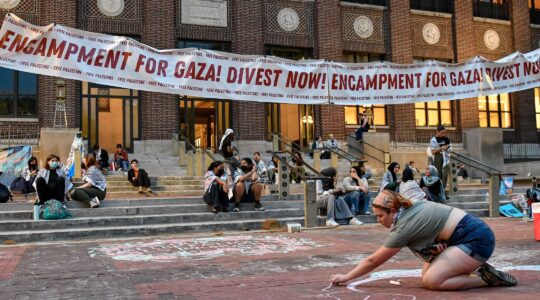ST. LOUIS, Mo. (St. Louis Jewish Light) – The tent movement is spreading.
In Israel, tent cities are popping up throughout the country as part of a broad social protest against high housing prices in the Jewish state.
In America, Hillel just announced it is planning to set up tents at 20 campuses across the country this fall as places for respectful dialogue about Israel and Middle East issues.
“The purpose of the tent is to grapple with the challenges that Israel is facing and that will play out on college campuses,” said Sharon Ashley, head of the recently formed Center for Israel Engagement, which operates under Hillel’s auspices.
Ashley introduced the initiative, called Talk Israel, at Hillel’s annual conference last week, held this year at Washington University in St. Louis.
The tents, set to go up for a full day sometime in late September, are part of Hillel’s response to the expected vote on Palestinian statehood at the United Nations in September. The tents might involve a video link with speakers as well as other common resources, but each campus on its own will decide the crux of the tent’s activities. Hillel has not yet chosen which campuses will get a tent.
“The tent has got flaps, but at the same time it’s open,” Wayne Firestone, Hillel’s president, said in his plenary address at the conference. “It’s open in the sense that we want to be open and inviting to students that want to engage in conversations about Israel that we are so passionate about, and we refuse to allow ourselves to be marginalized and polarized by those on the edges and outside the tent.”
Ashley, a former journalist and longtime resident of Israel, said she hoped tent visitors would come away with a sense that the Jewish state is more than just the conflict. Other than the existence of Israel itself, she said any issue is up for discussion. Opinions can be offered freely as long as the bounds of civility are observed.
“You are welcome in this tent to ask questions, but you can’t have all the answers,” she said. “This is not a one-off event. This is hopefully something that can be replicated in the spring.”
More than 400 students from U.S. Hillels came to St. Louis for the conference, and they were joined by about as many professionals from the Jewish campus group. Washington University was hosting the weeklong event for a second consecutive year.
In his speech, Firestone also spoke about using social networking to connect Jews, calling Hillel the “Facebook of the Jewish people” and talking about how the models for engaging young Jews increasingly are bottom-up rather than top down. They focus on students not as passive consumers, he said, but as active “prosumers” who bring content and meaning to the interaction.
Aaron Weil, a St. Louis native who now heads the Pittsburgh Hillel, said he thought the conference was valuable.
“It gives colleagues the opportunity to connect with one another,” said Weil, who was honored with Hillel’s Exemplar of Excellence Award. “One of the challenges of Hillel is that because we are so spread out around the world, it can be easy to get stuck in a silo mentality where all you know is what you see and experience on a day-to-day basis.”
Arielle Weil, a 19-year-old art student at Elon University in North Carolina, said the conference allowed her to understand the best ways to interact with the few Jewish students on her small campus.
“We’re learning new techniques to reach out to them initially at the beginning of the school year as well as to have more conversations that build relationships, not just to get them to come to Hillel but to get them to feel more comfortable at the university itself,” she said.
Desiree Soleymani, a 21-year-old psychology major from UCLA, said she felt refreshed by the event and ready to return to her campus and accomplish new objectives.
“I feel like the staff has taken the opportunity to get to know us and ask us questions as students,” she said. “It’s nice to feel valued and like my opinions matter.”

Help ensure Jewish news remains accessible to all. Your donation to the Jewish Telegraphic Agency powers the trusted journalism that has connected Jewish communities worldwide for more than 100 years. With your help, JTA can continue to deliver vital news and insights. Donate today.





